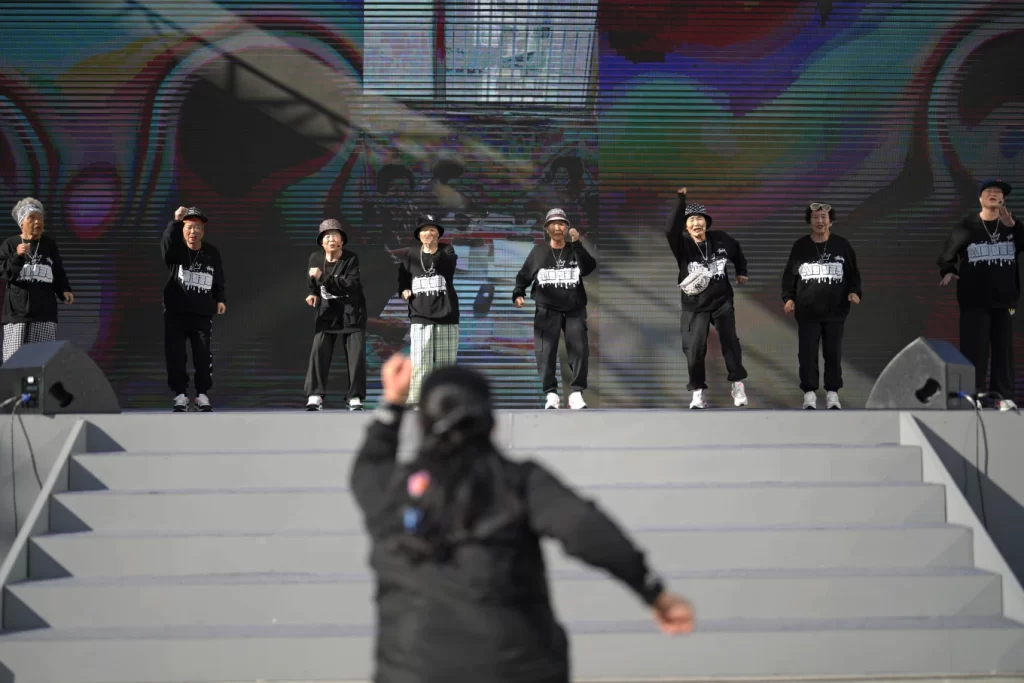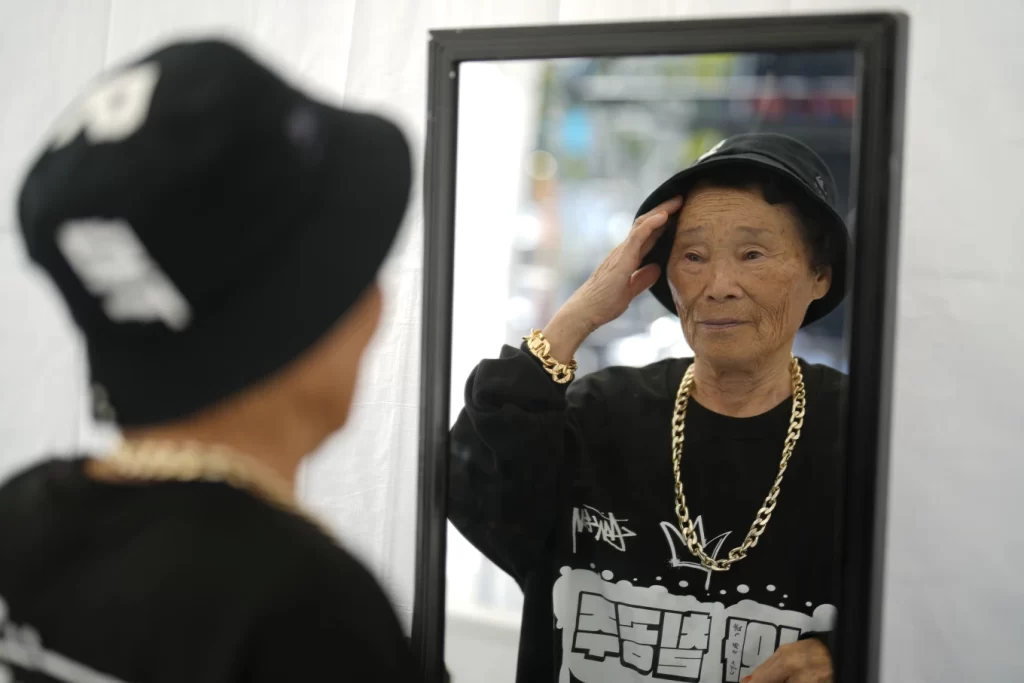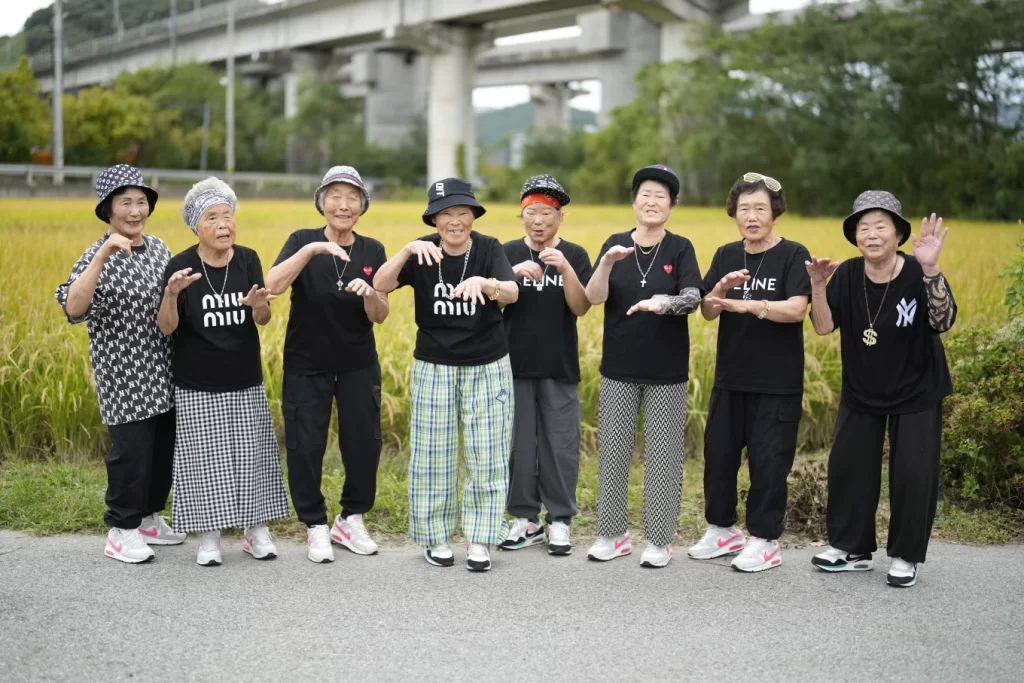In the landscape of contemporary South Korea, where youth often dominate conversations surrounding culture and creativity, a remarkable phenomenon has emerged that defies conventional norms: the story of Park Jeom-sun, affectionately known as Suni, and her ensemble, Suni and the Seven Princesses.
At the age of 82, Park embodies a captivating juxtaposition of age and modernity, challenging the notion of aging through her joyful embrace of rap music and the artistic expression it facilitates.
As an octogenarian sensation, Park and her friends shine a light on the indomitable spirit of lifelong learning and the transformative power of self-expression, particularly for women who have historically navigated a myriad of societal barriers.
Park Jeom-sun and her companions reflect a generation of women who, belonging to a past rife with socio-economic challenges, are now breaking free from the constraints of traditional roles.
Born during a period marked by limited opportunities for female education, Park and her friends embarked on a journey to learn hangeul, the Korean alphabet, at a community center in their rural farming village in southeastern South Korea.
This endeavor was not merely an act of acquiring literacy but a profound reclamation of agency. The fact that these women, who have lived through tumultuous historical periods, are now finding joy in the written word and the rhythm of rap speaks volumes about the resilience and adaptability of the human spirit.
The serendipitous evolution from learning to write to performing rap showcases a blend of past experiences and contemporary culture.
Park and her friends initially gathered for educational purposes but soon discovered an innate love for poetry, which naturally transitioned into rap.
The decision to perform rap is notable not just for its audacity but also for its relevance; rap, a genre deeply rooted in personal narratives and societal issues, offers a vibrant platform for their voices.
By rapping about aspects of their everyday lives—such as the cultivation of chili peppers, cucumbers, and eggplants—they not only celebrate their identities as farmers but also assert the value of their experiences in a rapidly evolving society.
The popularity of Suni and the Seven Princesses has transcended mere local recognition. Their journey has resonated widely, resulting in a national phenomenon that highlights the significance of intergenerational connection and the potential for cultural trends to be redefined.
Their performances, characterized by their unique combination of energetic choreography, poignant lyrics, and retro fashion statements—epitomized by Park’s oversized bucket hat and silver chains—create a captivating spectacle that captures the attention of audiences across the country.
The group’s viral status on social media and their appearances in commercials signify not just entertainment but a cultural shift that values inclusivity and diversity in age and expression.
A noteworthy moment in their journey occurred when South Korean Prime Minister Han Duck-soo congratulated them on their one-year anniversary, commending their dedication to learning and the spirited approach to life that they embody.
Such recognition serves not only as an acknowledgment of their artistic contributions but also as a broader societal affirmation of the capabilities of older adults.
In a culture that often marginalizes aging, Suni and the Seven Princesses stand as a testament to the idea that creativity does not diminish with age; instead, it can flourish, offering new avenues for engagement and connection.
The personal narratives shared by Park Jeom-sun illustrate the profound impact of learning and artistic expression on mental health and well-being.
Park’s reflection on her ability to navigate her world independently—even mastering tasks as fundamental as going to the bank or riding the bus—underscores a critical aspect of empowerment through education.

Her assertion that learning hangeul and embracing rap have contributed positively to her cognitive health presents a valuable perspective, particularly in discussions surrounding aging and dementia.
In a society grappling with the challenges posed by an aging population, stories like Park’s can illuminate potential pathways for advocacy and support systems that promote lifelong learning and engagement for older adults.
Moreover, the intergenerational relationships highlighted within this narrative, particularly the pride expressed by Park’s granddaughter, Kang Hye-eun, further enrich the understanding of community bonds and familial love.
Kang’s admiration for her grandmother’s achievements not only spotlights the importance of encouraging older adults to pursue their passions but also emphasizes the role of younger generations in recognizing and uplifting the contributions of their elders.
This reciprocal dynamic fosters an environment where learning and creativity are celebrated across age groups, creating a cohesive society that honors its roots while embracing innovation.
In conclusion, the journey of Park Jeom-sun and Suni and the Seven Princesses represents more than a mere artistic endeavor; it is a movement that challenges societal perceptions of aging, gender, and creativity.
Their story resonates as a beacon of hope, inspiring both the elderly and the youth to recognize the power of expression as a means of empowerment.
Through their vibrant performances, these octogenarian women encourage society to view aging not as a period of decline, but as an opportunity for renewed passion, creativity, and learning.
As South Korea continues to evolve, let the story of Suni and her friends serve as a reminder that it is never too late to chase dreams, engage in lifelong learning, and find joy in the rhythm of life.
It is truly inspiring to witness the remarkable journey of Park Jeom-sun and her friends, collectively known as Suni and the Seven Princesses.

Their vibrant spirit and passion for learning illustrate the transformative power of education, regardless of age. The fact that they have found joy in rap as a medium to express themselves while mastering hangeul is a testament to their creativity and resilience.
Moreover, their rise to fame not only highlights their individual talents but also underscores the importance of lifelong learning and community engagement.
It is heartening to see them celebrated and recognized by figures such as the South Korean Prime Minister, which amplifies their message of empowerment through education.
Park’s sentiments about the joys of literacy and its impact on her independence resonate deeply, reminding us all of the fundamental right to learn and thrive at any stage of life.
Their story is an encouragement for others to pursue their passions, no matter the obstacles, and it serves as a beacon of hope and creativity in the community.
